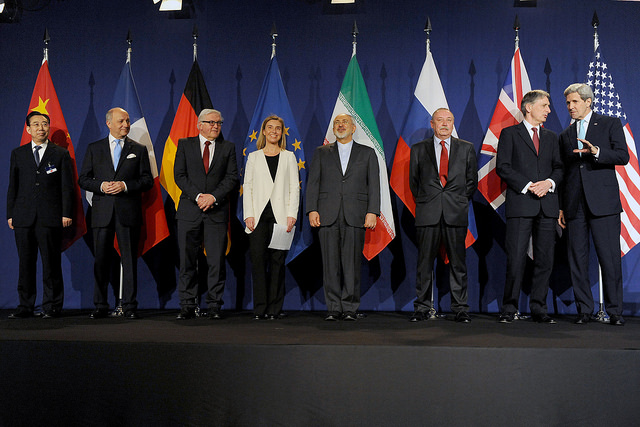Waning optimism for the Iran nuclear deal
The success of P5+1 in reaching the Lausanne framework agreement with Iran over its nuclear program should be regarded as a diplomatic milestone for the involved parties, particularly the United States. As diplomatic ties between Iran and the US have not been restored since being severed after the hostage crisis, constructive talks should be a cause for celebration and optimism not only over the prospect of an agreement in the interest of non-proliferation, but also for restored dialogue between two powers in tension.

Participation of Federica Mogherini, High Representative of the Union for Foreign Affairs and Security Policy and Vice-President of the EC at the the Iran nuclear negotiations in Lausanne
However, the optimism that came out of Lausanne is shifting into disheartenment as Iran appeared to selectively read or ignore foundational parameters set by P5+1. It is insistent on rapid and unconditional, as opposed to phased and conditional sanctions relief, and is only willing to grant managed and narrow monitoring of military sites
Neither side of the negotiating table are on the same page when it comes to these critical ground rules, which was the purpose of the hard-won framework deal to begin with. While creative solutions and options for sanctions relief exist which could satisfy both sides of the negotiating table, inflexibility on transparency and monitoring could be the insurmountable disagreement that could prove terminal.
Impeded monitoring may shorten Iran’s breakout time as it would take longer for the IAEA to detect an attempt at a nuclear device. Given that the restrictions that will be placed on Iran through a deal would, according to the US, lengthen Iran’s breakout time to at least one year (a red line for the US), it appears that accepting anything less than unprecedentedly thorough inspections will constitute a deal breaker. But this raises questions about whether the problem presented by Iran’s nuclear program is exceptional enough to realistically expect Iran to grant this much access. As Ali Vaez at the International Crisis Group points out, no sovereign state would allow free and spontaneous inspections of its military sites.
But Even as Iranian senior negotiator Abbas Araghchi reiterated that UN access to Iranian scientists or military site inspections are out of the question, a US official at the negotiations believes that a deal can still be struck before June 30. It is unclear whether this is because the US believes they can make the Iranians shift their position as the deadline looms closer or if they have contingency plans and solutions for a falling through of the inspections demand.
The former appears highly unlikely as it seems to be a directive from Supreme Leader Khamenei, whose only input into the negotiations are apparently to set red lines and parameters for his negotiators while remaining publicly neutral on the talks themselves, possibly to placate domestic hardliners who could derail the deal, and as a form of a diplomatic public relations exercise. His implicit support for the talks as a means to restoring Iran’s economy, and supporting his negotiators indicates that he is open to meaningful dialogue. In conjunction, his red lines ensure that should a deal fail, the regime will have the domestic support it needs to weather further sanctions with relative stability. Given that his red lines are framed in terms of defending Iran’s dignity and sovereignty, an unsuccessful deal means that he can frame its failure under the narrative of the P5+1 attempting to bully Iran into capitulation.
Of course, in reality it will ultimately be Iran’s own obstinacy that undermines the deal. And even with a successful deal, their track record of non-compliance and concealment makes it difficult to envision a scenario where Iran complies with the imposed restrictions. Be that as it may, if anything positive is to be taken from this process, it is the possibility of a diplomatic thaw between Iran and the West, and what could be the beginning of its slow integration into the international community.
It is still in the best interest of all parties to not further isolate Iran and to continue to work towards a reliable and verifiable system of checks and balances as an alternative to conflict and a state of permanent tension. Non-engagement and hostility will all but ensure a recalcitrant, hard-line and reactionary Iranian regime into the future.
Novan Sachrudi is a recent graduate of the University of New South Wales, completing his Bachelor of Arts with Honours in International Relations. His research interests are Middle Eastern politics, the War on Terror, US foreign policy, Asia-Pacific defense and security, and political philosophy and theory.